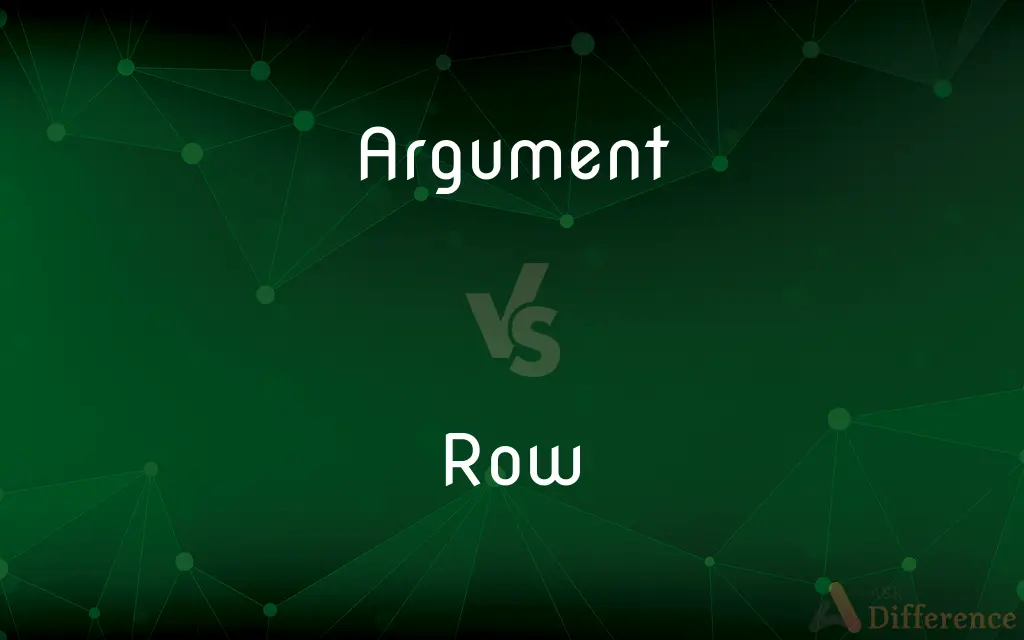Argument vs. Row — What's the Difference?
By Urooj Arif & Fiza Rafique — Updated on June 10, 2024
"Argument" typically refers to a discussion or debate where differing views are expressed, often in a structured or logical manner, while "row" suggests a louder, more chaotic disagreement usually involving emotional exchanges.

Difference Between Argument and Row
Table of Contents
ADVERTISEMENT
Key Differences
An argument typically involves a reasoned exchange where each party presents their viewpoints or evidence. It is often used to persuade or discuss a particular issue logically, whereas a row is characterized by loud and emotional conflict, often without much reasoning or logical structure.
In an argument, participants may remain calm and collected, aiming to win over the other side with compelling points and rational discourse. A row, on the other hand, is marked by shouting, anger, and sometimes physical altercations, emphasizing the emotional aspect of the disagreement.
Arguments can occur in various settings such as academic debates, business meetings, or personal conversations, where logic and evidence are paramount. Rows are more commonly associated with personal or domestic situations where tempers flare and emotions run high.
The tone of an argument is generally more measured and controlled, reflecting a desire to resolve differences through dialogue. Conversely, the tone of a row is aggressive and confrontational, with participants often more interested in expressing their anger than in finding a solution.
An argument can be constructive, leading to a better understanding or compromise, whereas a row is typically destructive, often leaving relationships strained or damaged. This difference in outcomes highlights the contrasting nature of these disputes.
ADVERTISEMENT
In written form, an argument can be presented as a coherent essay or article with clear points and counterpoints. A row, by contrast, is less likely to be documented formally and is more about the immediate, heated exchange.
Comparison Chart
Nature
Structured discussion or debate with logical reasoning
Loud, emotional disagreement or quarrel
Purpose
To persuade, inform, or reach a conclusion through logic
To express dissatisfaction, frustration, or anger
Communication Style
Often calm and reasoned, focusing on facts and logic
Characterized by raised voices, emotional expressions, and potentially chaotic exchanges
Outcome
May result in mutual understanding, agreement, or resolution
Often ends without a clear resolution, focusing more on venting emotions
Context
Common in academic, professional, or formal settings
More likely in personal, informal, or highly emotional situations
Compare with Definitions
Argument
Any dispute, altercation, or collision.
Steve got in a physical argument with his neighbor and came away with a black eye.
While biking home, he got in an argument with the pavement.
Row
To take part in a noisy quarrel or disturbance.
Argument
A discussion involving differing points of view, where participants use logic and reasoning to persuade or present their case.
The scientists engaged in a detailed argument over the implications of the new research findings.
Row
A noisy or quarrel or disturbance.
Argument
A situation where individuals express conflicting opinions or beliefs, often in a structured and civilized manner, seeking to clarify differences or persuade others.
The authors had a friendly argument about the themes of the novel during the panel discussion.
Row
A noisy argument.
There was a row among the oarsmen about how to row.
Argument
A process of reasoning, or a controversy made up of rational proofs; argumentation; discussion; disputation.
The argument is about things, but names.
Row
A loud noise.
Argument
To make an argument; to argue.
Row
A continual loud noise.
Who's making that row?
Argument
A reasoned exchange of ideas or opinions aimed at reaching an understanding or resolving a specific issue.
During the meeting, they had a constructive argument about the best course of action for the project.
Row
(intransitive) To argue noisily.
Argument
An aspect of debate or discourse where evidence and reasoning are employed to support or contest a proposition or belief.
Her argument for adopting renewable energy sources was compelling and well-supported by data.
Row
Rough; stern; angry.
Argument
To put forward as an argument; to argue.
Row
A noisy, turbulent quarrel or disturbance; a brawl.
Argument
A reason or reasons offered in proof, to induce belief, or convince the mind; reasoning expressed in words; as, an argument about, concerning, or regarding a proposition, for or in favor of it, or against it.
Row
An angry dispute;
They had a quarrel
They had words
Argument
A discussion in which reasons are advanced for and against some proposition or proposal;
The argument over foreign aid goes on and on
Row
A public disturbance or commotion arising from collective disagreement or discontent, often loud and disruptive.
The decision by the city council led to a row among the community members who gathered outside the building.
Argument
A formal or academic discussion or paper presenting a point of view on a particular topic, supported by evidence and analysis.
His argument on the economic impacts of climate change was published in a reputable journal, contributing significantly to the field.
Row
An emotional confrontation or dispute where rational discourse is overshadowed by the intensity of the participants' feelings and reactions.
The cancellation of the concert at the last minute caused a row among the fans who had been waiting for hours.
Row
A conflict or disagreement that escalates into a noisy and heated exchange, sometimes resulting in unresolved tensions.
The siblings entered into a row about the inheritance that left both parties feeling bitter.
Row
An intense verbal altercation characterized by shouting and strong emotional expressions, reflecting deep disagreements or frustrations.
Their discussion about politics turned into a row, disturbing the peace of the evening.
Row
A loud, often chaotic dispute or quarrel marked by emotional outbursts, typically occurring in informal or personal settings.
The neighbors had a loud row over the fence that divided their properties.
Common Curiosities
What distinguishes an argument from a row?
An argument is generally a reasoned discussion or debate where participants present differing views, often with the aim of reaching an understanding or conclusion. A row, conversely, implies a noisy, emotional disagreement, often without a clear resolution and more focused on venting frustration.
Can an argument turn into a row?
Yes, an argument can escalate into a row if it becomes heated and participants resort to emotional outbursts or personal attacks, moving away from reasoned debate.
Can arguments be constructive?
Absolutely. Constructive arguments are those in which the parties involved respect each other's perspectives, focus on the issue at hand, and use logical reasoning to reach a deeper understanding or resolve a dispute.
Is a row always negative?
While "row" often has a negative connotation, implying a lack of control and constructive communication, it can also lead to the airing of grievances that might eventually result in a clearer understanding between parties, though this is not always the case.
Are there contexts where a row is more appropriate than an argument?
While "appropriate" might vary by personal standards, a row might occur in situations where emotions run high and the immediate goal is to express strong dissatisfaction or disagreement. However, for productive discussions, especially in professional or formal contexts, an argument (in the sense of a reasoned debate) is generally more appropriate.
How can you prevent an argument from becoming a row?
Preventing an argument from escalating into a row involves maintaining respect for all participants, focusing on the issue rather than personal attacks, and striving for calm, clear communication. Listening actively and acknowledging other viewpoints can also help.
What typically triggers a row?
A row can be triggered by a variety of factors, including misunderstandings, strong disagreements on personal matters, or situations where emotions run high, often escalating quickly due to the intensity of feelings involved.
How can one de-escalate a row?
Deescalating a row involves calming emotions, possibly by taking a break from the discussion to cool off, speaking in a lower and softer tone, and actively listening to the other party's perspective without immediate judgment or interruption.
What is the purpose of having an argument?
The purpose of having an argument is to exchange differing viewpoints in a structured manner, aiming to persuade, inform, or arrive at a mutual understanding or solution through reasoned discourse.
How should one prepare for an argument in a formal setting?
Preparing for a formal argument involves researching the topic thoroughly, understanding both sides of the issue, formulating clear and logical points, and anticipating counterarguments to defend one's position effectively.
Share Your Discovery

Previous Comparison
Swap vs. Change
Next Comparison
Literary vs. LiteracyAuthor Spotlight
Written by
Urooj ArifUrooj is a skilled content writer at Ask Difference, known for her exceptional ability to simplify complex topics into engaging and informative content. With a passion for research and a flair for clear, concise writing, she consistently delivers articles that resonate with our diverse audience.
Co-written by
Fiza RafiqueFiza Rafique is a skilled content writer at AskDifference.com, where she meticulously refines and enhances written pieces. Drawing from her vast editorial expertise, Fiza ensures clarity, accuracy, and precision in every article. Passionate about language, she continually seeks to elevate the quality of content for readers worldwide.
















































